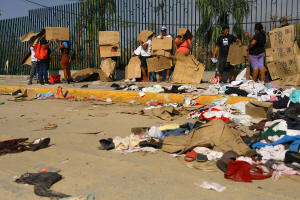Mexico's Acapulco hit by garbage pile-up after deadly hurricane
 Send a link to a friend
Send a link to a friend
 [November 11, 2023]
By Troy Merida [November 11, 2023]
By Troy Merida
ACAPULCO, Mexico (Reuters) - Residents of Acapulco stunned by a
devastating hurricane are now battling with another blight trailing in
the storm's wake: garbage piling up in streets, fanning concern about
the spread of disease in the Mexican beach resort.
Hurricane Otis, which roared through Acapulco in the early hours of Oct.
25, was the most powerful storm on record to strike Mexico's Pacific
coast, killing dozens of people and wrecking thousands of homes in the
city of nearly 900,000.
Its 165 miles per hour (266 km per hour) winds caused major flooding,
destroying furnishings, bedding and household appliances that were
dumped outside homes alongside bags of rotting organic waste that have
fed putrid smells in the city.
The government has sent in thousands of soldiers to help clean up
Acapulco, but residents say rubbish has engulfed some areas so quickly
that even traffic is being held up.

"They need to come and get the trash because there's too much of it,"
said Rosa Pacheco from the La Mira neighborhood in the west of the city,
where some locals have had to remove rubbish from roads to allow cars to
get through.
"There's almost no way through, because there's more and more trash
every day," the 46-year-old homemaker added.
Mexico's Civil Protection authority did not reply to a request for
comment, but the government said getting Acapulco cleared up is a top
priority.
When questioned about the garbage this week, President Andres Manuel
Lopez Obrador said authorities are fumigating the city to prevent
disease, and would deal with the problem.
[to top of second column]
|

People protest against what they say is the lack of government help,
in the aftermath of Hurricane Otis, in Acapulco, Mexico, November 5,
2023. REUTERS/Jose Luis Gonzalez

"Everything is going to be cleaned up," he said.
Food, water and other basic necessities ran low after shops were
ransacked and power and communications went down in the wake of
Otis, so the government has directed much of its energy toward
ensuring residents receive essential supplies.
However, experts on the spread of disease have warned that
mosquito-borne illnesses such as dengue could begin cropping up if
the city allows waste to block drainage and harm the water supply.
Mosquitoes breed in standing water.
"Let's say getting drinking water and power up and running again is
the top priority, then removal of waste, ensuring drainage is
working and sorting out stagnant water," said Alejandro Macias, a
leading Mexican epidemiologist.
If not, he said, conditions could be ripe for yellow fever
mosquitoes. "When you've got large numbers of yellow fever
mosquitoes, dengue outbreaks are only a matter of time."
(Reporting by Troy Merida; Writing by Dave Graham; Editing by Bill
Berkrot)
[© 2023 Thomson Reuters. All rights
reserved.]This material
may not be published, broadcast, rewritten or redistributed.
Thompson Reuters is solely responsible for this content.
 |